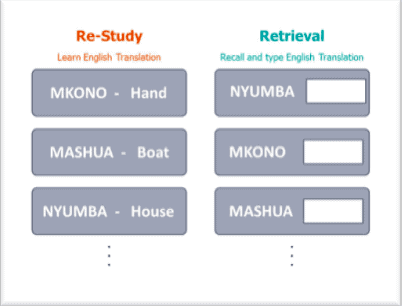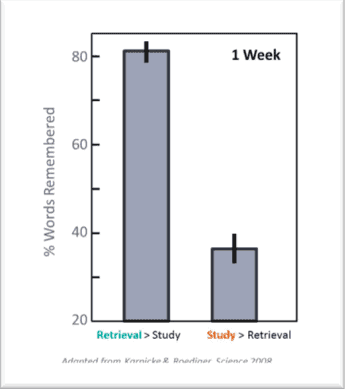Retrieval practice is a strategy to rehearse already learned information by trying to retrieve it from memory: to locate the piece of information in your mind. It is based on what is known as “the testing effect”: the findings that future long-term memory performance is enhanced when content is practised by testing. Unfortunately, tests are often negatively associated with assessment and performance measurement. In retrieval practice tests are used as a tool for learning and to practise, rather than as a means to formally assess progress.
Evidence that it works
Retrieval practice tops a list of the most effective evidence-based learning strategies.1 It was shown to be effective for learners of all ages and subjects.
Retrieval practice is often compared to strategies like re-reading or re-studying. Re-reading is a very common way of practising among students, and it is often recommended by teachers as well. Re-reading the book or the notes seems perfectly reasonable: we are re-exposing ourselves to previously learned material in order to secure it in our minds. We can actually feel the benefit as we are practising this method of rehearsal. However, this method has been found to be ineffective. More accurately, re-reading may be effective in the very short term (defined loosely between minutes and a few days), but is almost entirely ineffective for longer-term recall. The major difference between re-reading and retrieval practice is that when you re-read, the information is presented to the learner in its entirety from an external source, while with retrieval the learners search for the information in their own minds, following just a cue.
An influential study2 published in the journal Science in 2008 clearly demonstrated this point: Karpicke and Roediger let college students learn 40 words in Swahili and their translation to English. The experiment included study phases in which each word appeared next to its translation on a computer screen, and retrieval phases in which the Swahili words appeared and participants were requested to type the English translation if they could recall it.

These phases repeated alternately four times each. All the participants were tested on their memory one week later. The goal of the study was to find out which of the study phases, re-study or retrieval, contributed more to long-term performance. To test that they changed the number of words in each phase for different groups: one group faced twice as much retrieval repetitions than re-study repetitions, and another group experienced it the other way around.
Here is their memory performance after one week:

The group that had two-thirds of their study trials in the form of test, averaged 8o% of the words.
The group that had two-thirds of their study trials in the form of study, averaged 36% of the words.
Additional experimental groups showed that extra study repetitions did not improve the final recall performance, and were therefore a waste of learning time.
This study showed that testing is a very effective practice strategy.
Many other studies showed the benefits of retrieval practice with more complex stimuli, such as passages of text, different types of materials and within educational settings.
Why does retrieval work?
When we try to retrieve memories we focus on reconstructing the pathway to the stored information, and we go over the sequence of neural activities that is required in order to bring a piece of information to mind. In re-studying we are focusing on the information, practically ignoring the pathway leading to it. When we use retrieval practice we rehearse the entire pathway, not just the end goal. Much like navigation, knowing the way is as important as knowing the destination.
Retrieval practice is obviously a more effortful task, but the effort is the reason it works. It is interesting to note that the concept of rehearsal is intuitive to most learners; we usually appreciate the importance of practice in acquiring mastery. Yet, learners often disregard the question “What to rehearse?” Rehearsing the learned information is straightforward, easier and more rewarding so it is often the intuitive choice. But if the end goal is to be able to retrieve the information and use it whenever required, it becomes clear that we need to rehearse just that: retrieving information and using it. So retrieval practice is more challenging, but it is the more effective way to practise, as in the old saying “use it or lose it”.
How to make retrieval effective
- Make retrieval effortful. Our mind should work hard, reconstructing partially deconstructed pathways. If it is too easy, it means that nothing was reconstructed, and nothing was added. In addition, retrieval is not effortful when it is a concept that we have already mastered, or when it is too soon after the last learning or practice session. The straightforward way to make retrieval practice effective is to space the study repetitions over time.
- Provide feedback. Feedback provided after the retrieval attempt will improve the learning. One component of effective feedback should be correcting misconceptions and misunderstanding. Another is reinforcing correct responses. Delayed feedback is often more beneficial than immediate feedback.
- Provide the right level of support. Retrieval practice has been shown to work even with young children, but it may require more structure and support (Link here). Students at different ages and stages of the learning (novices or advanced) benefit from different types of retrieval activity (e.g. fill in the blank, multiple choice question or open questions). One thing to keep in mind is that retrieval practice as a form of practice should come after learning rather than at the time of learning.
How to make it work in the classroom
It is useful to frame retrieval practice as a learning activity. The way we approach the activity (e.g. quiz or review), how it is framed (e.g. surprise quiz or morning review routine), and how much room we leave for making mistakes and correcting them are essential factors in the successful application of retrieval practice. It can be useful to explicitly explain why retrieval practice is effective and why it is used. Here is an example for a simple class activity that also develops students’ metacognitive skills.
It is highly recommended to build retrieval practice activities into the learning routine in the classroom, rather than suggesting that students use it at home by themselves. Most students will instead revert to easier strategies such as re-reading. It is sometime challenging to make time for a questionnaire or review during the lessons, but it is probably worthwhile. This example from a secondary history teacher, and this detailed application from a higher-education psychology professor are compelling and user-friendly examples of retrieval practice in action.
Another reason to apply retrieval practice in the classroom rather than at home is the ability to make it available to all learners. When retrieval practice is applied during class time, as a learning activity in which all students participate individually and discretely, we are actually promoting the learning of all students, and also their skills to learn effectively in the future. When a teacher asks a question to the whole class, generally only a few students volunteer to answer, and it is only the student who actually answers that student that receives the benefits of retrieval practice.
There are many simple methods teachers can use to make whole class questioning a form of retrieval practice. For example: cold-calling, using student response cards, or personal mini-white boards. There are also a number of technological solutions that do the same, but enable the added value of storing the information for formative purposes, like kahoot!, socrative or notably plickers (which allows individual and discrete, digitally registered answers without the use of students’ personal devices).
More information sources
The Learning Scientists is a website founded by cognitive psychologists Dr Yana Weinstein and Dr Megan Sumeracki. It introduces students, parents and teachers to six learning effective strategies and the research behind them. It has blogs, by both scientists and teachers, podcasts and videos and a series of downloadable posters (one for each strategy) that simply and visually demonstrate retrieval practice and other strategies. You also can find a collection of resources on teachers’ implementations of retrieval practice as well as a summary of the many benefits of this method.
Retrieval Practice is a website by cognitive psychologist Pooja Agarwal that specifically introduces retrieval practice to teachers, with helpful resources and recommendations for teachers.
The book “Make it Stick: The Science of successful Learning” by Brown, Roediger and McDaniel is a very readable book about research-based effective learning strategies. It uses personal stories and vivid examples to discuss the benefits of retrieval practice among other effective methods.
References
- Dunlosky, J. (2013). Strengthening the student toolbox: Study strategies to boost learning. American Educator, 37(3), 12-21. [PDF]
- Karpicke, J. D., & Roediger, H. L. (2008). The critical importance of retrieval for learning. science, 319(5865), 966-968. [PDF]
Referenced Blogs:
How to Create Retrieval Practice Activities for Elementary Students by Megan Sumeracki (formerly Smith) via “The Learning Scientists” http://www.learningscientists.org/blog/2017/4/6-1
Color Coding Recall Attempts to Assess Learning by Blake Harvard via “The Effortful Educator” https://theeffortfuleducator.com/2017/09/14/color-coding-recall-attempts-to-assess-learning/
Nothing new, it’s a review – on why I killed my starters by Ben Newmark https://bennewmark.wordpress.com/2017/11/13/nothing-new-its-a-review-on-why-i-killed-my-starters/
Retrieval Practice: The What, Why, and How for Classroom Instruction by Pooja Agarwal via NOBA Blog http://nobaproject.com/blog/2017-11-08-retrieval-practice-the-what-why-and-how-for-classroom-instruction
Technique 22: Cold Call via Teach Like a Champion http://teachlikeachampionch4.blogspot.com/p/technique-22-cold-call.html
Students Response Cards via The teacher Toolkit http://www.theteachertoolkit.com/index.php/tool/student-response-cards
THE Number 1 Bit of Classroom Kit: Mini-whiteboards by Tom Sherrington via teacherhead https://teacherhead.com/2012/08/28/the-number-1-bit-of-classroom-kit-mini-whiteboards/
